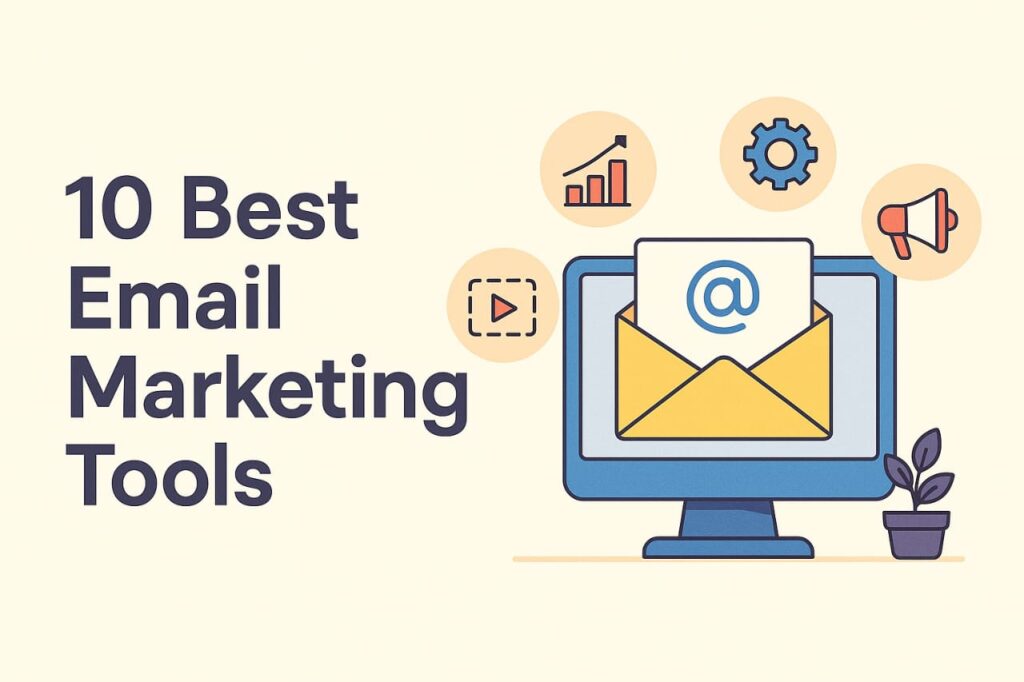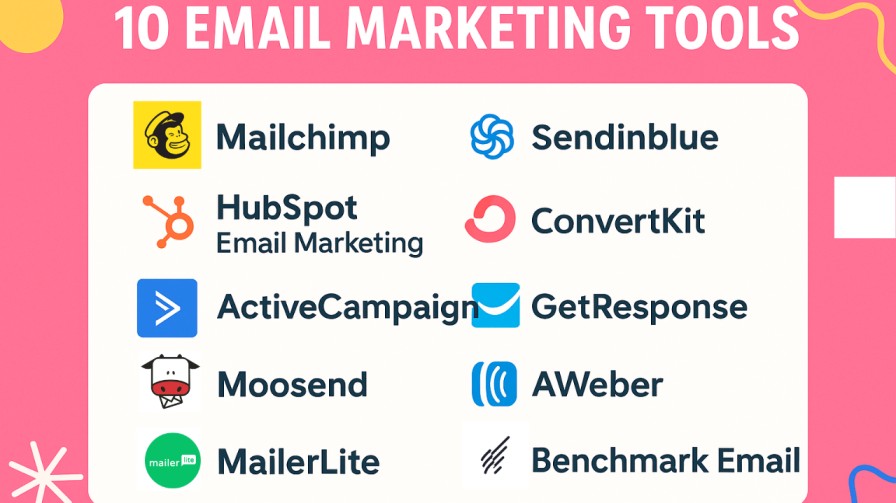Discover the 10 Best Email Marketing Tools in 2025 to boost engagement, reach, and conversions with easy-to-use platforms for every business.

Even in 2025, email marketing remains one of the most effective ways to reach your audience. Whether you run a small business, blog, or large company, using the right Email Marketing Tools can help you:
- Increase open rates
- Boost click-through rates
- Build long-term relationships with subscribers
- Automate campaigns to save time
With so many tools available, it can be overwhelming to choose the right one. That’s why we’ve compiled the 10 Best Email Marketing Tools in 2025 that are reliable, feature-rich, and user-friendly.
What Makes a Great Email Marketing Tool?
Before diving into the list, it’s important to understand what features make Email Marketing Tools effective:
- Ease of Use: The tool should be simple for beginners yet powerful for advanced users.
- Automation: Ability to schedule emails, create drip campaigns, and follow-ups automatically.
- Analytics & Reporting: Track open rates, click-through rates, and subscriber engagement.
- Integrations: Connect easily with CRM, e-commerce platforms, and social media.
- Deliverability: Emails should land in the inbox, not spam.
- Templates & Customization: Pre-designed templates that are mobile-friendly and visually appealing.
Keeping these factors in mind ensures you choose Email Marketing Tools that actually improve your marketing efforts.
Top 10 Email Marketing Tools in 2025 – Overview
Here’s a quick look at the 10 tools we’ll cover in detail:

- Mailchimp
- Sendinblue
- HubSpot Email Marketing
- ConvertKit
- ActiveCampaign
- GetResponse
- Moosend
- AWeber
- MailerLite
- Benchmark Email
We’ll now go through each tool, highlighting their key features, pros, cons, and why they are among the best Email Marketing Tools.
1. Mailchimp
Mailchimp remains a popular choice for beginners and small businesses.
Key Features:
- Drag-and-drop email builder
- Pre-built templates
- Advanced segmentation
- Analytics and reporting
Pros:
- Free plan available for up to 500 subscribers
- Easy to use for beginners
- Great automation features
Cons:
- Can get expensive as your subscriber list grows
- Some advanced features require higher-tier plans
Mailchimp is a solid choice for anyone starting with Email Marketing Tools, offering simplicity without sacrificing functionality.
2. Sendinblue
Sendinblue is perfect for businesses that need both email marketing and SMS campaigns.
Key Features:
- Email and SMS campaigns
- Marketing automation
- Transactional emails
- A/B testing
Pros:
- Affordable pricing for small and medium businesses
- Excellent automation options
- Pay-as-you-go email credits
Cons:
- Email templates could be more modern
- Interface slightly complex for new users
Sendinblue is highly versatile and ranks among the top Email Marketing Tools for businesses looking for multi-channel marketing.
3. HubSpot Email Marketing
HubSpot is a complete marketing platform with powerful Email Marketing Tools built in.
Key Features:
- Drag-and-drop editor
- Personalization and segmentation
- CRM integration
- Detailed analytics
Pros:
- Integrated with HubSpot CRM
- Great for lead nurturing
- Free plan with basic features
Cons:
- Expensive for advanced features
- Can be overwhelming for beginners
HubSpot is ideal for businesses looking to combine email marketing with CRM for advanced engagement strategies.
4. ConvertKit
ConvertKit is widely used by creators, bloggers, and small businesses focusing on audience engagement.
Key Features:
- Visual automation builder
- Landing pages and forms
- Subscriber tagging and segmentation
- Integrations with e-commerce platforms
Pros:
- Simple and intuitive interface
- Excellent for growing email lists
- Great automation for content creators
Cons:
- Fewer design templates
- Limited advanced reporting
ConvertKit is a great choice if you want Email Marketing Tools that focus on content-driven engagement.
5. ActiveCampaign
ActiveCampaign is known for its powerful automation and CRM integration.
Key Features:
- Advanced marketing automation
- CRM (Customer Relationship Management) and sales automation
- Split testing and analytics
- Segmentation and personalization
Pros:
- Highly customizable workflows
- Excellent automation capabilities
- Strong analytics and reporting
Cons:
- Learning curve for beginners
- Can be pricey for small lists
ActiveCampaign is perfect for businesses looking for Email Marketing Tools that scale and offer deep automation.
6. GetResponse
GetResponse is an all-in-one marketing platform that offers robust Email Marketing Tools with a focus on automation.
Key Features:
- Drag-and-drop email editor
- Marketing automation workflows
- Landing pages and webinar hosting
- Advanced analytics and reporting
Pros:
- Great for email automation and webinars
- Multiple integrations with e-commerce and CRM platforms
- Flexible pricing plans
Cons:
- Some users find the interface slightly overwhelming
- Advanced features require higher-tier plans
GetResponse is ideal for businesses looking for Email Marketing Tools that combine email marketing with webinars and automation.
7. Moosend
Moosend is a user-friendly platform that offers affordable Email Marketing Tools for small businesses and creators.
Key Features:
- Drag-and-drop editor
- Automation workflows
- A/B testing
- Analytics and reporting
Pros:
- Affordable for small lists
- Simple and intuitive interface
- Pre-designed email templates
Cons:
- Limited integrations compared to bigger platforms
- Some advanced features are restricted to higher plans
Moosend is perfect if you want Email Marketing Tools that are simple, affordable, and still effective.
8. AWeber
AWeber has been around for years and remains a trusted choice for Email Marketing Tools.
Key Features:
- Pre-designed templates
- Drag-and-drop editor
- Automation and autoresponders
- Analytics and tracking
Pros:
- Easy to use for beginners
- Free plan available for up to 500 subscribers
- Solid customer support
Cons:
- Limited advanced automation
- Interface is a bit dated
AWeber is great for small businesses and beginners who need reliable Email Marketing Tools without a steep learning curve.
9. MailerLite
MailerLite is an affordable and beginner-friendly platform offering powerful Email Marketing Tools.
Key Features:
- Drag-and-drop editor
- Automation and segmentation
- Landing pages and pop-ups
- Analytics and reporting
Pros:
- Simple interface
- Free plan available for up to 1,000 subscribers
- Great for small businesses and bloggers
Cons:
- Limited templates compared to other platforms
- Some advanced features require paid plans
MailerLite is ideal for those who want Email Marketing Tools that are affordable, easy to use, and effective for growing lists.
10. Benchmark Email
Benchmark Email is a global platform offering email marketing solutions suitable for all business sizes.
Key Features:
- Drag-and-drop email builder
- Automation workflows
- A/B testing
- Analytics and reporting
Pros:
- Easy-to-use interface
- Free plan for up to 250 emails per month
- Good customer support
Cons:
- Limited advanced automation features
- Templates could be more modern
Benchmark Email is perfect for businesses that want simple, reliable Email Marketing Tools without unnecessary complexity.
Comparison of the Top 10 Email Marketing Tools
Here’s a quick comparison to help you choose the right tool:
| Tool | Best For | Key Feature |
|---|---|---|
| Mailchimp | Beginners | Simple automation & templates |
| Sendinblue | SMBs (Small and Medium-sized Business) | Email + SMS campaigns |
| HubSpot | CRM integration | Email + CRM + analytics |
| ConvertKit | Creators | Audience engagement & automation |
| ActiveCampaign | Advanced automation | CRM + advanced workflows |
| GetResponse | All-in-one marketing | Automation + webinars |
| Moosend | Small businesses | Easy automation |
| AWeber | Beginners | Autoresponders & templates |
| MailerLite | Bloggers & SMBs | Easy-to-use & automation |
| Benchmark Email | SMBs | Simple automation & analytics |
How to Choose the Right Email Marketing Tool
Choosing the right Email Marketing Tools depends on:
- Business size and budget: Free plans are good for beginners, paid plans for growth.
- Automation needs: If you want advanced workflows, choose tools like ActiveCampaign or GetResponse.
- Integrations: Ensure the tool works with your CRM, e-commerce, or social media platforms.
- Ease of use: Beginners may prefer Mailchimp, MailerLite, or AWeber.
- Support and resources: Check if the platform offers tutorials, webinars, or support.
Tip: Start with a free plan if available. Test multiple tools and pick the one that fits your workflow.
Tips to Maximize Your Email Marketing Efforts
Using the right Email Marketing Tools is just the start. Here’s how to get the most out of them:
- Segment your audience: Send targeted emails for higher engagement.
- Use automation: Set up drip campaigns to nurture leads automatically.
- Optimize subject lines: Catchy subject lines improve open rates.
- Test and analyze: A/B test emails to find what works best.
- Mobile-friendly emails: Most users check emails on mobile—ensure templates are responsive.
Combining these strategies with the right Email Marketing Tools can boost ROI and engagement significantly.
Final Thoughts
In 2025, using Email Marketing Tools effectively is critical for growth. Whether you’re a blogger, creator, or business owner, choosing the right platform ensures your campaigns reach the right audience at the right time.
From Mailchimp for beginners to ActiveCampaign for advanced automation, these 10 tools cover a wide range of needs. Remember, the best tool is the one that fits your audience, budget, and marketing strategy.
Implementing these tools alongside segmentation, automation, and testing will ensure your email marketing campaigns in 2025 are successful and engaging.
Pingback: Best Email Marketing Platforms in 2025 for Small Businesses - auraclix
Pingback: 10 Best Email Marketing Services in 2025 to Grow Your Business Fast (Free & Paid Options) - auraclix